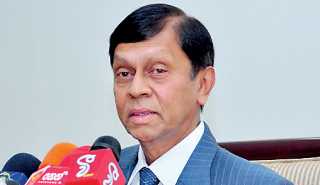- Swap arrangements to attract investment through Treasury bills and bonds
- Says Govt. in talks with many investors to attract FDIs
- Pledges comfort and confidence to investors so that more money will come in
- Deposits in banking sector and non-banking sector approximately Rs. 10 t
- Says stock market seeing revival with daily turnover around Rs. 1 b in past month
By Chandani Kirinde
 Ajith Nivard Cabraal |
The Government will offer swap arrangements to investment that could come into the country through Treasury bills and bonds, Capital Markets and State Enterprises Reforms State Minister Ajith Nivard Cabraal told Parliament yesterday, outlining plans to boost growth through attracting investment.
“Through that swap arrangement we are hoping to attract more and more investors to come in which will ensure that Sri Lanka will have a stable rupee and a strong reserves and allow us to confront any situation,” Cabraal said, while winding up the Parliamentary debate on Notifications under the Ports and Airports Development Levy Act, Customs Ordinance and the Revenue Protection Act presented to the House for approval.
The State Minister said the revival of the economy would take time with the International Monetary Fund (IMF) also saying that this year the world would experience around 4.5% of negative growth. He opined that in a slow growth scenario, it was necessary to “break free and move forward with more investments”.
“Attracting investment is going to be somewhat challenging but we are hoping to meet that challenge by providing comfort as well as confidence to investors from all over the world so that more money will come in,” Cabraal said.
He said that, not only through Treasury Bills and Bonds, but the Government hopes to attract Foreign Direct Investment (FDI) as well.
“There are many who are talking to us who are hoping to come into Sri Lanka with their investments and we are confident before long this entire trend will change,” he said.
Cabraal noted that the stock market had been picking up and in the last one month, turnovers had risen to over Rs. 1 billion almost every day. “We have also seen the All Share Price Index (ASPI) increasing and once there is a sustainable situation, we will see investors return to Sri Lanka. In the meantime, we have enough investors in the country as well,” he said.
The State Minister said that the deposit within the country today in the banking sector as well as the non-banking sector was approximately Rs. 10 trillion. “Of the Rs. 10 trillion, if we were to attract to the stock market about Rs. 100 billion, which is just 1% of that amount, that would mean capital gains will be enjoyed by Sri Lankans and not by foreigners. As a government that is always concerned about the Sri Lankan businesses and enterprises, we would like them to make a profit before the foreigners can,” he said.
Cabraal said the country’s banking sector too had to be strengthened. “We saw in the past five years the consolidation programs that we put in place prior to that ignored. We saw five finance companies collapse in the past five years whereas not a single failed in the nine preceding years,” he noted.
Cabraal said these are the ways in which the Government would tweak the economy so that it could go forward and ensure that Sri Lankan businesses and enterprises would thrive in the future.
“We also must implement these policies quickly and with confidence so that people all over the world know we are a government that means business. We are off to a good start. The President has given clear guidelines to all ministers and State ministers unlike ever done before,” he added.
He noted that in the past five years, the economy had declined as never seen before. “After nine years of continuous progress we saw five years which was a complete reversal in the growth momentum. Due to the inconsistent policies between different aspects in Government we saw poor implementation as well. On top of that there were the Easter Day attacks and then we had to experience COVID-19.”
He said even though the new Government inherited an economy in decline, after President Gotabaya Rajapaksa took office in November last year, he set about to revive the economy, to meet the COVID-19 challenge, instil confidence in the country’s economy, and create strong policies to take Sri Lanka forward in the next few years.
 would enable you to enjoy an array of other services such as Member Rankings, User Groups, Own Posts & Profile, Exclusive Research, Live Chat Box etc..
would enable you to enjoy an array of other services such as Member Rankings, User Groups, Own Posts & Profile, Exclusive Research, Live Chat Box etc.. 
 Home
Home

















